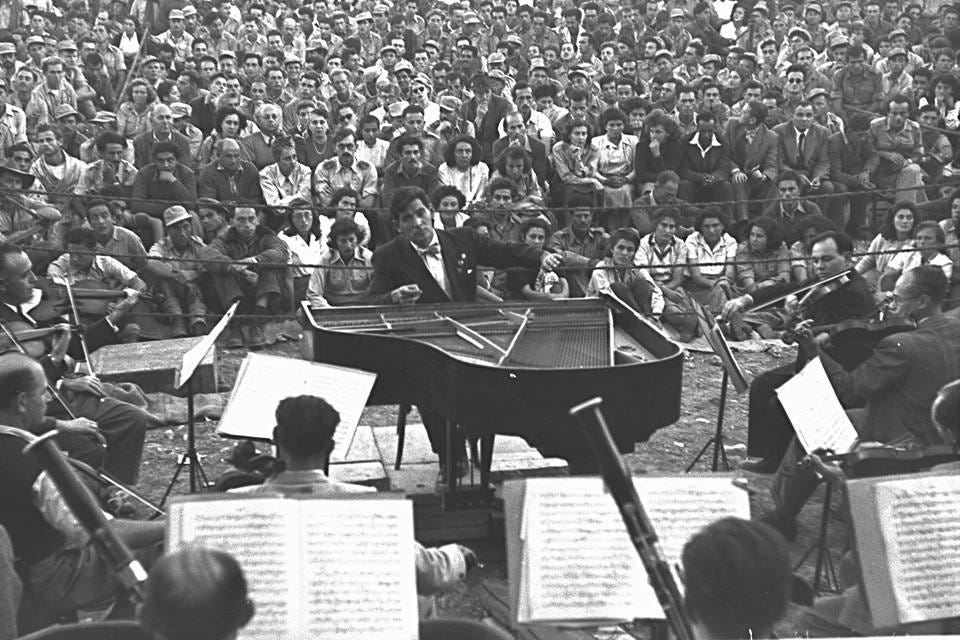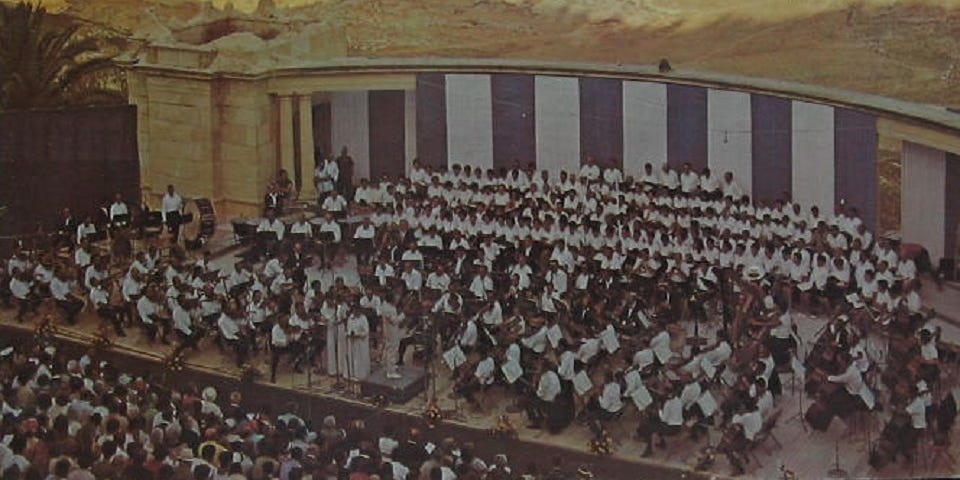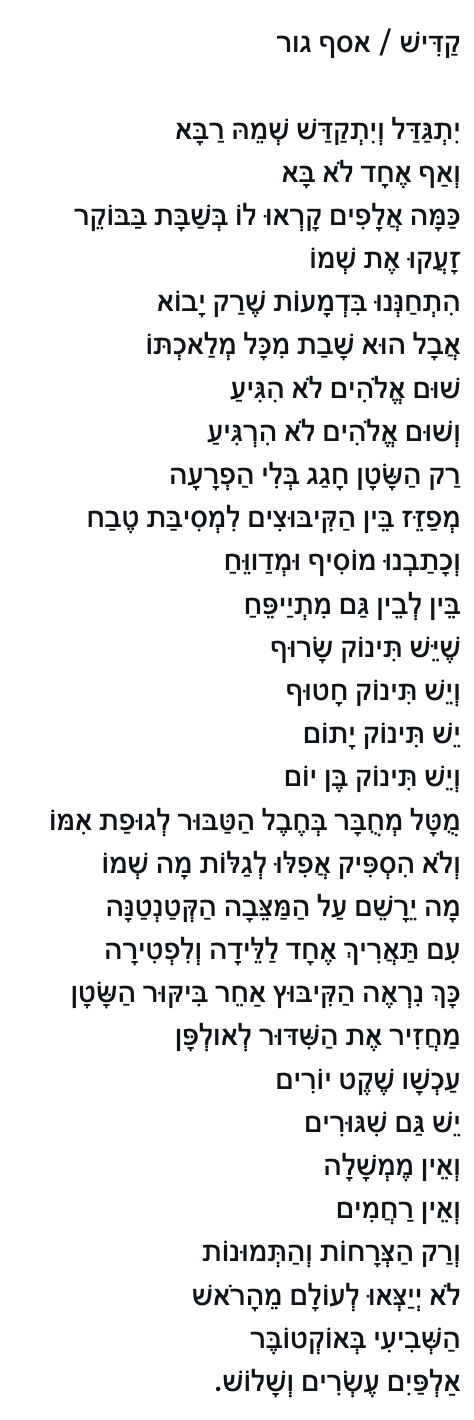Years ago, when I was just starting to think about how to write my history of Israel, I knew that in telling the story of the State of Israel, music and poetry would simply have to be part of the tale. There are certain poems, like those we have discussed over the years in Israel from the Inside, that had too much impact on Zionist and Israeli history not to be included. It’s not an exaggeration to say that without Bialik’s City of Slaughter, Zionist history might have been different. One can scarcely overstate the impact of Alterman’s The Silver Platter on generations of Israelis and their sense of duty and their sense of the holiness of their (entirely secular) mission.
In today’s post, we will begin with music, we’ll go on to images, and then we’ll conclude with a poem—not an old classic, but brand new poem that is making its way around Israeli social media.
The mere fact that in the midst of the horror in which we find ourselves—the horror of October 7 and the emerging sense among many Israelis that this slog may go on for quite some time (a subject for later this week)—poetry is being forwarded time and again tells you something about this place.
As you will hear from the introduction to the above performance of the Israeli Philharmonic Orchestra (IPO), the IPO, which was founded long before the state was created, has been part of Israel’s history from the get go. As the moderator notes, Leonard Bernstein actually performed with the IPO in 1948, outside, just after IDF forces had captured Beer Sheva.
The IPO’s iconic role in Israeli history would continue.
I grew up with an LP that my parents bought that had a recording of the victory concert performed on Mt. Scopus shortly after the Six Day War. Not surprisingly, it opens with Hatikvah, and then went on to Mendelsohn’s Violin Concerto (Bernstein performed, with Isaac Stern as the violin soloist)—I remember that as a kid I listened to that LP hundreds of times. I can’t hear the Mendelsohn piece without thinking of Mt. Scopus, of victory snatched from the jaws of devastation, without imaging what it must have felt like to live in an Israel that that was no longer in danger, that was finally safe.
Which brings us to this week’s IPO performance—before an empty auditorium. (Large gathering are not permitted, because on ongoing rocket fire.) In parts of the video, you’ll see shots of the audience section of the auditorium. You’ll see that it’s empty, except for some signs on many of the seats.
Each of them is the name and photograph of one of the hostages being held in Gaza.
They can’t hear it, but the concert was for them. At least no less than for us.
The full performance can be watched on YouTube and I encourage you to do so. Yet because the words of Lahav Shani—the conductor—between the Paul Ben-Haim Fanfare to Israel and Beethoven’s Eroica Symphony are so important—but were unfortunately not subtitled completely—we have excerpted the YouTube and added the subtitles that were missing so you can appreciate all that he said.
There was, as we’ve said, no one in the audience during the performance. Had there been, though, it is tragically obvious that they would not have been feeling that Israel is “finally safe.”
But we we’ll see in posts later this week, the people that matter believe with every fibre of their being that that day will still come. So do I.
The music is very beautiful. And the Hatikvah at the beginning is, well … listen for yourself.
FROM SOULFUL MUSIC TO HEARTRENDING IMAGES
I begin with a warning. The images in the video below are graphic. They are not, I am told by those who put the video together, nearly the worst of what is out there—one shudders to imagine—but they are hard.
The video is an attempt on Israel’s part to address the Muslim world, to insist that the horrors that Hamas perpetrated are entirely anathema to what Islam stands for. I’ll let religious scholars debate whether that is true—for I know scholars on both sides of that divide. What matters here is not an analysis of Islam, but rather, Israel’s attempt to reach decent Muslims world-over and to convince them that to support Hamas is not to support what Islam stands for.
The video is well done, but again, it is hard.
My own view is that those of us who can, need to force ourselves to watch the scenes, because only then can one understand the rage and furor at the core of Israel’s decision-makers, and of its citizens. But you decide what is right for you.
This was not a terrorist attack. Even the word Pogrom may not suffice. What this was, was … there are no words. Which is why Israel is sharing the images.
!!! WARNING — CONTAINS GRAPHIC SCENES !!!
AND FINALLY, TO POETRY
I think it says something extraordinary about this society that in the midst of everything, one of the many thousands upon thousands of posts getting forwarded again and again is a poem. It’s entitled Kaddish, and is by Asaf Gur.
The following translation is rough but good enough to convey the message, and the beauty of Gur’ writing.
Yitgadal ve-yitkasah shemai rabbah But no one came How many thousands called out to Him that Shabbat morning Cried out His name Pleaded in tears that He arrive But He rested from all His labors No God came and no God comforted It was Satan who celebrated unfettered Moving crazily between the kibbutzim to the slaughter party And our correspondent is continuing to report At times also sobbing there there is a burnt baby and there is a kidnapped baby And there is an orphaned baby And there is a one-day-old baby lying there, connected by the umbilical cord to his mother's corpse They didn't even have a chance to reveal what his name was What should be written on the tiny headstone that will have the same date for birth and death This is what the kibbutz looks like after Satan came And now, back to you in the studio For now, it's quiet. They're firing there are also launches and there's no government and there's no mercy Only the screams and the images will never leave our heads The seventh of October Two thousand and twenty-three
Gur is right. No one came.
Actually, he’s only mostly right. Because some people did come, and the stories of their heroism, their sacrifice and the souls they saved will become as iconic as the stories we still tell about 1948.
There’s a “road” outside Jerusalem that was hastily constructed during the War of Independence, called the “Burma Road” (why it got that name doesn’t matter for now). When we first got to Israel in the late 1990’s, we would take our kids hiking every year on Independence Day. One year, we were hiking on the Burma Road, and we came upon an old man sitting on a folding chair. A small crowd had gathered around him, and we joined. He was telling the story of how he and his comrades had fought there, right there in that exact place, whom they’d lost, and how they’d won.
“You’re celebrating today,” he didn’t have to say, “because of what we did then, right here, on this very spot.”
I’m sure he’s gone now; it’s been more than twenty years.
But there’s going to come a day, I have no doubt, that my now three-month-old granddaughter, whom I’ve holding during the day while her father is off in the army, is going to take her kids to the south. Maybe it’ll even be on Yom HaAtzma’ut. Perhaps at a place named Be’eiri. Or Nachal Oz. Or Kfar Aza.
And there will be an old man sitting on a folding chair, or an old woman on a folding chair, and she or he will tell our great-grandchildren what they did back then, in 2023, and how they saved those they saved, and mourned those they lost.
Because of them, and because we’re still writing poetry, still performing music, and yes, arming ourselves to the teeth for the ground incursion that may or may not come, I hope and pray that our great-grandchildren will understand, even if that old woman or old man never says it, echo’ing the JFK quote in the IPO video:
“It’s because of us that you still live here. It’s because of us the the music didn’t die, but only became more intense.
That’ll be for our grandchildren and great grandchildren.
For now, it’s up to our generation, together with that of our kids—when they get back from the front—to write the new melody.
As explained above, Shalem College is making use of it financial infrastructure to help the Hamal (which we covered in a previous post) collect funds, and to get 100% of the funds to the Hamal immediately. To support the Hamal, use the link immediately below. There is a place on the web page to note that you want your contribution to be directed to the war effort.
If you’re just joining us, Israel from the Inside typically posts a written column on Mondays and a podcast on Wednesdays. That is obviously irrelevant for the time being.
We’ve delayed all the podcasts that were ready to go, because the people whose stories they tell deserve to tell them when we all have the bandwidth to hear. Hopefully, that will return some day.
In the interim, we’ll post as possible. Here in Israel, there are non-stop funerals to go to, shiva homes to visit, grandchildren to help care for while sons and daughters are in the army, so we’ll see.
Schedules are the least of our worries.
Impossible Takes Longer is now available on Amazon and Barnes & Noble and at other booksellers.
Our Twitter feed is here; feel free to join there, too.
Our Threads feed is danielgordis. We’ll start to use it more shortly.













Israel speaks to the Muslim world about religion, while Israelis speak to each other—as they always have, in music and in poetry